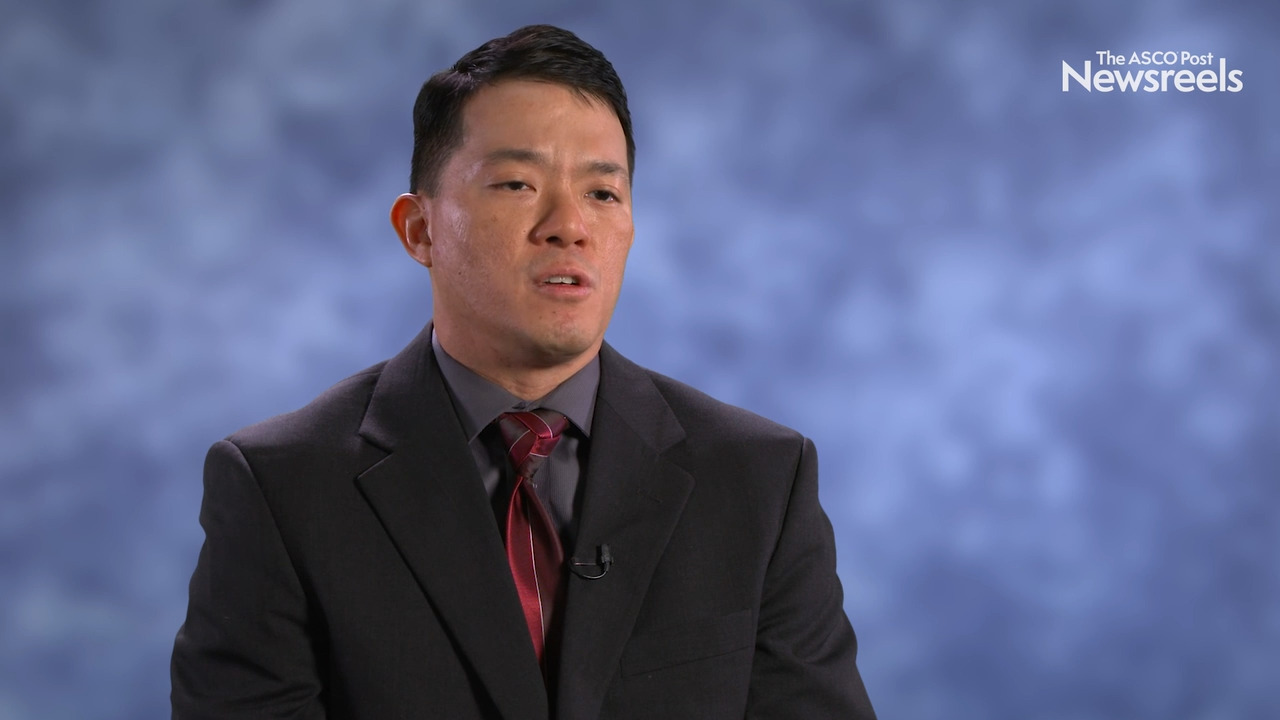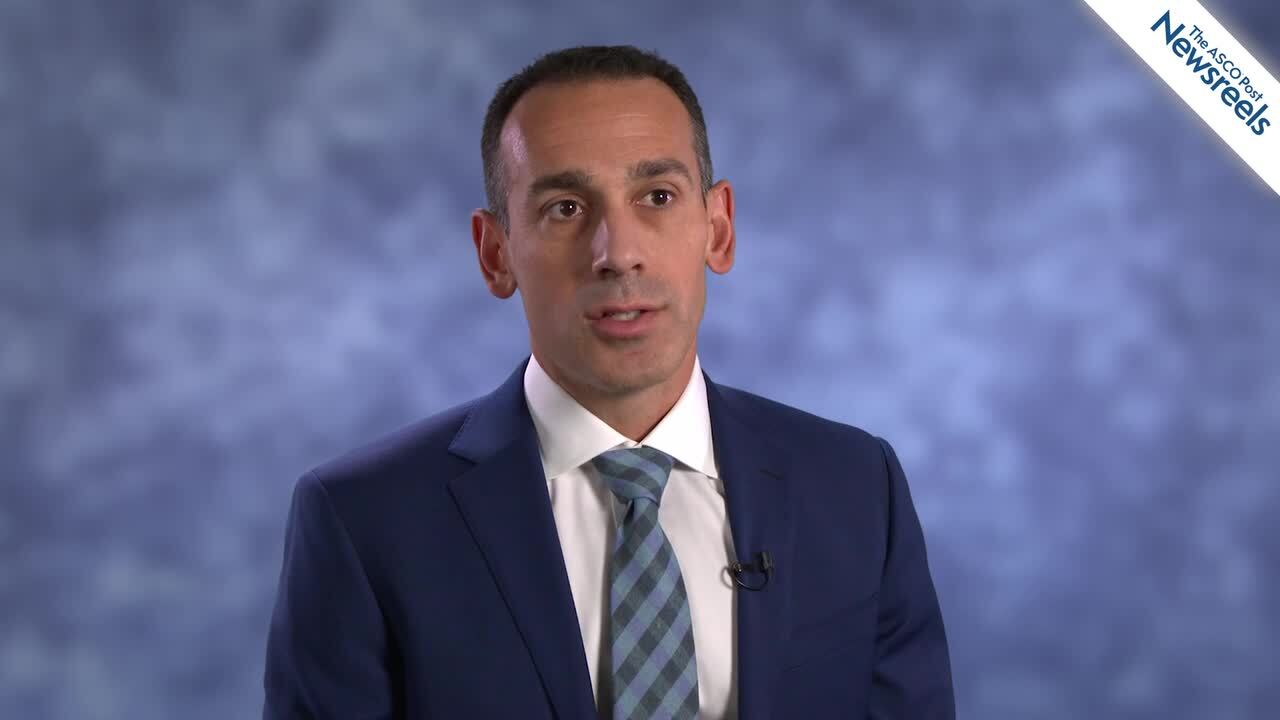Blood Test Predicts Recurrence of HPV-Driven Oropharyngeal Cancer After Treatment
A blood-basedliquid biopsy may accurately predict recurrence of human papillomavirus (HPV)-driven oropharyngeal squamous cell carcinoma following treatment, according to data presented at the 2022 Multidisciplinary Head and Neck Cancers Symposium.1 Results of the large, multi-institutional study...
Midtreatment Imaging De-escalates Therapy for Half of Study Patients With Oropharyngeal Cancer
Positron-emission tomography (PET) scans obtained before and midway through treatment may be used to de-escalate therapy for patients with oropharyngeal cancer, leading to fewer side effects, according to data presented at the 2022 Multidisciplinary Head and Neck Cancers Symposium.1 An interim...
Elizabeth D. Cash, PhD, on Addressing the Psychological Aspects of Head and Neck Cancer
Elizabeth D. Cash, PhD, of the University of Louisville, discusses depression among patients with head and neck cancer, the impact it can have on prognosis, and the importance of helping patients cope through screening for depressive symptoms and treatment with collaborative care models.
Michelle Mierzwa, MD, on Oropharyngeal Cancer: Early Results on De-escalated Radiotherapy
Michelle Mierzwa, MD, of the University of Michigan, discusses early findings from a phase II trial of FDG-PET (fluorodeoxyglucose–positron-emission tomography) de-escalated radiotherapy for patients with p16-positive orophyaryngeal cancer. An interim analysis suggests that for approximately half of patients with stage I or II disease, this type of treatment may decrease toxicity and improve quality of life.
David S. Hong, MD, on New Findings on Tisotumab Vedotin-tftv in Patients With Head and Neck Squamous Cell Carcinoma
David S. Hong, MD, of The University of Texas MD Anderson Cancer Center, discusses results from a phase II cohort, which suggest favorable antitumor activity with tisotumab vedotin-tftv in patients with head and neck squamous cell carcinoma that has progressed after treatment with a platinum-containing regimen. Additional research is warranted, says Dr. Hong, in the second-line setting as well as in treatment-naive patients in combinations with pembrolizumab and carboplatin.
Peter Zeng, MD/PhD Candidate: Immune Cell Signature Predicts Survival in HPV-Associated Head and Neck Cancer
Peter Zeng, MD/PhD Candidate, at Ontario’s Western University, discusses a three-gene prognostic classifier tool, known as UWO3, which was validated in six external cohorts and shown to identify patients with human papillomavirus–related head and neck cancer that is likely to recur following aggressive radiation de-escalation.
Nancy Lee, MD: Toward Personalization of Radiotherapy for HPV-Related Oropharyngeal Carcinoma
Nancy Lee, MD, of Memorial Sloan Kettering Cancer Center, discusses results from the 30ROC trial, which showed that intratreatment FMISO [(18)F-fluoromisonidazole] PET response could identify patients with human papillomavirus–positive oropharyngeal carcinoma who may be sensitive to radiation therapy. Based on this information, researchers were able to de-escalate radiotherapy to 30 Gy from the standard 70 Gy, in the setting of chemotherapy (Keynote II).
Glenn J. Hanna, MD, on Oropharyngeal Squamous Cell Carcinoma: Detecting Occult Recurrence
Glenn J. Hanna, MD, of Dana-Farber Cancer Institute and Harvard Medical School, discusses findings that show human papillomavirus circulating tumor DNA (HPV ctDNA) may be useful as part of surveillance monitoring of patients with oropharyngeal squamous cell carcinoma. Dr. Hanna reports that 93% of patients who had no clinical evidence of disease developed a positive HPV ctDNA test during surveillance follow-up and subsequently had confirmed disease recurrence.
Postoperative Weekly vs Every-3-Week Cisplatin in Chemoradiation for Locally Advanced Head and Neck Cancer
In a Japanese phase II/III trial (JCOG1008) reported in the Journal of Clinical Oncology, Kiyota et al found that overall survival with once-weekly cisplatin in postoperative chemoradiation was noninferior to every-3-week cisplatin for patients with high-risk locally advanced squamous cell...
Elective Upper-Neck vs Whole-Neck Irradiation in Nasopharyngeal Carcinoma
In a Chinese phase III trial reported in The Lancet Oncology, Tang et al found that elective upper-neck irradiation sparing the uninvolved neck was noninferior in regional relapse–free survival vs standard whole-neck irradiation in previously untreated patients with nasopharyngeal carcinoma. Study...
Disadvantaged Patients Less Likely to Receive Advanced Radiotherapy Techniques for Head and Neck Cancer
Advanced radiotherapy techniques can reduce the risk of severe and debilitating toxicity associated with radiation, but not all patients have equal access to these modalities, according to data presented by Neal S. McCall, MD, at the 2022 Multidisciplinary Head and Neck Cancers Symposium (Abstract...
Midtreatment Imaging De-escalates Therapy for Half of Patients With Oropharyngeal Cancer
Positron-emission tomography (PET) scans obtained before and midway through treatment can be used to de-escalate therapy for oropharyngeal cancer, potentially leading to fewer short-term side effects, according to data presented by Allen et al at the 2022 Multidisciplinary Head and Neck Cancers...
Phillip Pifer, MD, PhD, on Head and Neck Squamous Cell Carcinoma: New Data on Focal Adhesion Kinase
Phillip Pifer, MD, PhD, of the UPMC Hillman Cancer Center, discusses findings that suggest focal adhesion kinase is a potentially important target for therapeutic sensitization in patients with mutant TP53 HPV-negative head and neck squamous cell carcinoma.
Biomarker Test May Predict Recurrence of HPV-Driven Oropharyngeal Cancer
A large, multi-institutional study demonstrated that a blood test to detect circulating tumor DNA may accurately predict recurrence of human papillomavirus (HPV)-driven oropharyngeal cancer following treatment. Results also indicated that the biomarker test may detect recurrent disease earlier than ...
Reduction in Elective Radiotherapy Dose and Field in Definitive Chemoradiotherapy for HPV-Associated Oropharyngeal Carcinoma
In a single-center retrospective cohort study reported in JAMA Oncology, C. Jillian Tsai, MD, PhD, and colleagues found that a systematic approach of reducing radiotherapy dose and target volume to elective treatment regions was associated with a high rate of locoregional control in patients with...
Reduced-Intensity Chemoradiotherapy in EBV DNA–Selected Locoregionally Advanced Nasopharyngeal Carcinoma
In a Chinese phase II trial reported in the Journal of Clinical Oncology, Li et al found that treatment with two cycles of concurrent cisplatin and intensity-modulated radiotherapy (IMRT) was noninferior to three cycles in progression-free survival and associated with reduced toxicity in patients...
Study Examines Head and Neck Cancer Incidence in Black Populations Around the World
Researchers have found that disparities in the incidence of head and neck cancer are driven by behavioral and environmental risk factors rather than race. They demonstrated this in the first-ever study to compare head and neck cancer incidence in Black patients in the United States, the Caribbean,...
Mehmet Altan, MD, on Solid Tumors: Interim Safety and Efficacy Results on NKTR-255 Plus Cetuximab
Mehmet Altan, MD, of The University of Texas MD Anderson Cancer Center, discusses findings from a phase Ib dose-escalation study, which showed early evidence of activity for NKTR-255, an investigational IL-15 receptor agonist, plus cetuximab in patients with solid tumors. Treatment appeared to lead to expansion and proliferation of NK and CD8+ cells (Abstract 957).
Imaging Biomarker May Help to Risk-Stratify Patients With Head and Neck Cancer
A team of scientists has used artificial intelligence (AI) to identify which patients with certain head and neck cancers may benefit from reducing the intensity of treatments such as radiation therapy and chemotherapy. Their findings were published by Corredor et al in the Journal of the National...
New National Study Finds Oropharyngeal Cancer Incidence and Mortality Is Rising in the United States
Oropharyngeal cancer incidence among men is continuing to rise rapidly in nearly all 50 U.S. states and among women living in states in the Midwest and Southeast regions, according to a new study published by Damgacioglu et al in JAMA Otolaryngology–Head & Neck Surgery. In addition, the...
Neoadjuvant Chemotherapy and Mandibular Preservation in Operable Oral Cavity Cancer
In an Indian single-institution phase II study reported in the Journal of Clinical Oncology, Chaukar et al found that neoadjuvant chemotherapy was associated with mandibular preservation in approximately half of previously untreated patients undergoing surgery for squamous cell carcinoma of the...
Adding Pembrolizumab to Chemotherapy Improves Overall and Progression-Free Survival in First-Line Treatment of Advanced Esophageal Cancer
As reported in The Lancet by Jong-Mu Sun, MD, of Samsung Medical Center, Sungkyunkwan University, Seoul, and colleagues, an interim analysis in the phase III KEYNOTE-590 trial has shown that the addition of first-line pembrolizumab to chemotherapy resulted in improved overall and progression-free...
Radiation Therapy for HPV-Related Oropharyngeal Squamous Cell Carcinoma: Prospects and Controversies
In the treatment of patients with human papillomavirus (HPV)-related oropharyngeal squamous cell carcinoma, neither cancer outcomes nor measurable quality of life have yet been shown to differ between surgery- and radiotherapy-based approaches, according to Sue S. Yom, MD, PhD, FASTRO, Professor of ...
Optimizing the Use of Checkpoint Inhibitors in Recurrent or Metastatic Head and Neck Cancer
The management of recurrent and/or metastatic head and neck cancer is complex. Historically, patients with squamous cell carcinoma of the head and neck with local or regional recurrence were considered for salvage surgery or reirradiation (in high-volume centers or centers of expertise), with an...
Applying Research Data to Clinical Practice in Managing Head and Neck Cancer
The 2021 Winship Cancer Institute of Emory University Symposium: Updates in the Management of Head and Neck Cancer explored current paradigms for the multidisciplinary treatment of head and neck cancer.1 Moderated by Nabil F. Saba, MD, FACP, the Lynne and Howard Halpern Chair in Head and Neck...
De-escalation of Radiation Therapy for HPV-Positive, Intermediate-Risk Oropharyngeal Cancer
De-escalated adjuvant radiotherapy appears to be safe in patients with surgically resectable, human papillomavirus (HPV)--positive oropharyngeal cancers, particularly in patients without extranodal extension or pN2 disease by American Joint Committee on Cancer (AJCC) 8th edition. These findings...
Shauna Campbell, DO, on Head and Neck Cancer: Toxicity Associated With Hypofractionated IMRT
Shauna Campbell, DO, of Cleveland Clinic, discusses results from her study that showed hypofractionated intensity-modulated radiation therapy (H-IMRT) in the definitive or postoperative treatment of head and neck cancers using ≥ 50 Gy in 20 fractions appears to be safe and well tolerated with modest toxicity. Dr. Campbell suggests that prospective studies comparing the safety and efficacy of H-IMRT with those of conventionally fractionated IMRT are warranted (Abstract 2313).
FDA Pipeline: Novel Treatments in Lymphoma, Nasopharyngeal Cancer, Solid Tumors, and More
Recently, the U.S. Food and Drug Administration (FDA) granted Priority Review to agents for several kinds of lymphoma, as well as nasopharyngeal cancer; a Breakthrough Therapy designation for a treatment for patients with NTRK-positive advanced solid tumors; and Fast Track designation for...
Primary Transoral Surgery and Reduced-Dose Adjuvant Radiation Therapy for HPV-Positive Locally Advanced Oropharyngeal Cancer
As reported in the Journal of Clinical Oncology by Robert L. Ferris, MD, PhD, and colleagues, the phase II ECOG-ACRIN E3311 trial has shown high progression-free survival rates and good functional outcomes in patients with intermediate-risk human papillomavirus (HPV; p16)-positive locally advanced...
Daniel J. Ma, MD, on HPV-Associated Oropharyngeal Squamous Cell Carcinoma: Comparing Longer and Shorter Courses of Radiotherapy
Daniel J. Ma, MD, of the Mayo Clinic Alix School of Medicine, discusses results from a phase III study of patients with HPV-associated oropharyngeal squamous cell carcinoma. Comparing a 2-week course of de-escalated adjuvant radiation therapy with the standard 6-week course, investigators found that the shorter treatment appeared to have less toxicity, higher quality of life, and similar disease control as the longer standard-of-care treatment (Abstract LBA1).
David A. Palma, MD, PhD, on HPV-Associated Oropharyngeal Squamous Cell Carcinoma: Radiotherapy vs Surgery
David A. Palma, MD, PhD, of Ontario’s London Health Sciences Centre, discusses results of the ORATOR2 study, which compared two treatment options that could be de-escalated for patients with HPV-associated oropharyngeal squamous cell carcinoma: a lower-dose radiation approach (6 weeks instead of 7, often with chemotherapy) vs a transoral surgical approach (with low-dose radiation afterward, for 5 weeks) (Abstract LBA2).
Abiraterone for Castration-Resistant, Androgen Receptor–Expressing Salivary Gland Cancer
In an Italian single-institution phase II trial reported in the Journal of Clinical Oncology, Locati et al found that abiraterone acetate showed activity in patients with androgen deprivation therapy (ADT)-resistant, androgen receptor (AR)-overexpressing salivary gland carcinoma. As stated by the...
Study Finds Significant Variation in the Incidence of Nasopharyngeal Cancer Among Ethnic Subgroups of Asian Americans
Although nasopharyngeal cancer is quite rare in most parts of the world, including the United States, the cancer causes a significant health burden among Asian Americans, which is a fast-growing but understudied racial group. According to the results from a study by Lee et al presented at the...
Factors Associated With Risk of Hearing Loss in Pediatric Patients Receiving Radiation and Chemotherapy
In a single-institution cohort study reported in the Journal of Clinical Oncology, Keilty et al identified factors associated with an increased risk of hearing loss in pediatric patients receiving radiation therapy and chemotherapy for central nervous system and head and neck tumors. The study...
Guideline Rapid Update Provides New Direction on the Care of Patients With Residual Disease in Locally Advanced Esophageal Cancer
An ASCO guideline rapid update is revising recommendations for the management of locally advanced esophageal carcinoma to include provision of nivolumab following adjuvant chemoradiotherapy and surgery. The new guidance addresses treatment of patients with residual disease following resection and...
Role of Geriatric Assessment in Personalizing Therapy for Elderly Patients With Head and Neck Cancer
In a prospective evaluation of the role of comprehensive geriatric assessment in personalizing therapy for elderly patients with locally advanced head and neck squamous cell carcinoma (HNSCC), geriatric intervention changed therapeutic choices in about 1 out of 10 patients and played an important...
CheckMate 648: First-Line Nivolumab Regimens Improve Survival in Esophageal Squamous Cell Carcinoma
As first-line treatment of advanced esophageal squamous cell carcinoma, nivolumab-containing regimens improved overall survival over standard-of-care chemotherapy, according to the first results of the global phase III CheckMate 648 trial presented at the 2021 ASCO Annual Meeting by Ian Chau, MD,...
Novel Monoclonal Antibody Emerges as Potential First-Line Standard in Nasopharyngeal Cancer
A new first-line standard of care may be emerging for recurrent or metastatic nasopharyngeal carcinoma, based on the findings of the global phase III JUPITER-02 trial presented at the 2021 ASCO Annual Meeting by investigators from China.1 In the study, toripalimab, an anti–PD-1 monoclonal antibody, ...
HPV Vaccination and Projected Oropharyngeal Cancer Incidence Through the Year 2045
In a population-based age-period-cohort study reported in JAMA Oncology, Zhang et al estimated that current human papillomavirus (HPV) vaccination rates will have a limited impact on overall oropharyngeal cancer incidence through 2045, due to a high risk of oropharyngeal cancer in unvaccinated...
FDA Pipeline: Reviews for Agents in Acute Graft-vs-Host Disease, Nasopharyngeal and Ovarian Cancers
Recently, the U.S. Food and Drug Administration (FDA) granted Priority Review to an agent for the prevention of acute graft-vs-host disease; Breakthrough Therapy designation to an anti–PD-1 monoclonal antibody for the treatment of metastatic nasopharyngeal carcinoma; and Fast Track designation to a ...
First-Line Cisplatin Plus Gemcitabine or Fluorouracil for Advanced Nasopharyngeal Carcinoma: Final Overall Survival Analysis
As reported in the Journal of Clinical Oncology by Hong et al, the final overall survival analysis of the Chinese phase III GEM20110714 trial showed a significant benefit with gemcitabine/cisplatin vs fluorouracil/cisplatin as first-line treatment for recurrent or metastatic nasopharyngeal...
JAVELIN Head and Neck 100 Trial: When Failure Seems Fatal, Hope Is Not Lost
Data from KEYNOTE-048 showed that the combination of the checkpoint inhibitor pembrolizumab with platinum-containing therapy improved overall survival vs cetuximab plus chemotherapy in patients with recurrent or metastatic head and neck squamous cell carcinoma (HNSCC).1 The findings provided hope...
No Progression-Free Survival Benefit With First-Line Avelumab Plus Chemoradiotherapy in Squamous Cell Carcinoma of the Head and Neck
As reported in The Lancet Oncology by Nancy Y. Lee, MD, of Memorial Sloan Kettering Cancer Center, and colleagues, the phase III JAVELIN Head and Neck 100 trial has shown no improvement in progression-free survival with the addition of the PD-L1 inhibitor avelumab to chemoradiotherapy in patients...
Minimally Invasive Esophagectomy Followed by Intrathoracic vs Cervical Anastomosis for Esophageal Cancer
In a Dutch trial reported in JAMA Surgery, van Workum and colleagues found that intrathoracic anastomosis following total or hybrid minimally invasive esophagectomy for esophageal cancer was associated with significantly reduced risk of anastomotic leakage requiring intervention and other...
Weekly Outpatient Palliative Care Interventions Among Patients With Head and Neck Cancer
Over 90% of patients with head and neck cancer receiving curative-intent chemoradiation therapy found weekly palliative care visits to be a valuable addition to their treatment, a recent study published by Bauman et al in the Journal of Palliative Medicine found. Although palliative care is known...
Nivolumab in Resected Esophageal or Gastroesophageal Junction Cancer
On May 20, 2021, nivolumab was approved for adjuvant treatment of patients with completely resected esophageal or gastroesophageal junction (GEJ) cancer with residual pathologic disease after neoadjuvant chemoradiotherapy.1,2 Supporting Efficacy Data Approval was based on findings from the...
ASCO Releases Recommendations for Management of Salivary Gland Malignancies
Given the rarity of salivary gland malignancies—neoplasms that account for less than 1% to 5% of all head and neck cancers—limited evidence exists to support informed treatment guidance. The overall variability in the biologic behaviors of these neoplasms has further complicated clinical...
CheckMate 648: First-Line Nivolumab Regimens Improve Survival in Esophageal Squamous Cell Carcinoma
As first-line treatment of advanced esophageal squamous cell carcinoma, nivolumab-containing regimens improved overall survival over standard-of-care chemotherapy, according to the first results of the global phase III CheckMate 648 trial presented at the 2021 ASCO Annual Meeting by Ian Chau, MD,...
Study Explores Taste and Smell Dysfunction in Head and Neck Cancer Survivors
Most survivors of head and neck squamous cell cancers report that their sense of taste is dulled, changed, or lost during radiation treatment. In a study of taste and smell dysfunction in 40 cancer survivors, scientists found that the tips of these individuals' tongues were significantly less...
Adjuvant Metronomic Capecitabine for Locoregionally Advanced Nasopharyngeal Carcinoma
In a Chinese phase III study reported in The Lancet, Chen et al found that the use of adjuvant metronomic capecitabine improved failure-free survival vs observation after definitive chemoradiotherapy in patients with high-risk locoregionally advanced nasopharyngeal carcinoma. Study Details In the...











